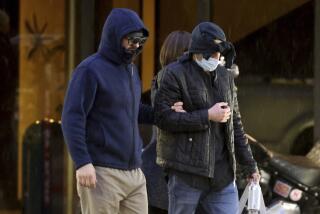Quattrone Was Told About Probe
- Share via
NEW YORK — Before he forwarded an e-mail urging workers to destroy documents, investment banker Frank Quattrone was warned that his firm was under criminal investigation, a key government witness testified Thursday.
Former Credit Suisse First Boston lawyer David Brodsky also said he urged Quattrone to retain a personal lawyer because he thought the banker was likely to be called as a witness in the probe.
Both warnings came before Quattrone endorsed a Dec. 5, 2000, e-mail urging CSFB bankers to “clean up those files,” Brodsky testified on the fifth day of Quattrone’s retrial on obstruction-of-justice charges.
At the time, the government was looking into how the bank had allocated shares of initial public offerings during the Internet boom of the late 1990s.
Quattrone contends he did not know the full scope of the probe and that he thought it centered on a unit of CSFB other than the technology investment bankers he commanded.
CSFB’s document retention policy required routine destruction of some documents, unless employees were aware that those documents were the subject of litigation.
On Thursday, prosecutors walked Brodsky through several e-mails he sent to Quattrone on Dec. 3, 2000, a Sunday, saying he needed to discuss with Quattrone “recent developments that are of extreme concern.”
The lawyer wrote: “We have received federal grand jury subpoenas asking for testimony and documents about the IPO allocation process.” He said a public leak of the investigation could seriously harm the bank.
“This is serious,” Brodsky wrote to Quattrone in another e-mail, “and unless I can slow it down and curtail what they [investigators] do, it will spread to others in the firm.”
Brodsky testified that his warning about getting a personal lawyer came in the afternoon of Dec. 5, 2000. Quattrone sent his e-mail a few hours later.
Both warnings from Brodsky were covered in the first trial of Quattrone, which ended in October in a hung jury. The banker is accused of obstruction of justice and witness tampering.
On cross-examination, Quattrone lawyer John W. Keker focused on a broad notice from CSFB lawyers suggesting that a large number of IPO documents should be kept -- a notice that did not go out until two days after Quattrone’s e-mail.
Keker also asked Brodsky whether a banker would have to know the specific documents covered in a subpoena in order to stop routine destruction of documents.
“The banker would have to know if it called for the production of documents in his or her area,” Brodsky answered.
The point is crucial for the defense, which contends that Quattrone did not believe his division was being scrutinized and thought the probe related specifically to only two IPOs.
Brodsky also said under cross-examination that although he believed Quattrone might be asked to testify in a criminal probe of the bank, he did not believe on Dec. 5 that Quattrone was in trouble.
During the defense questioning of Brodsky, increasingly loud laughter went up from portions of the courtroom audience, including Quattrone acquaintances, as U.S. District Judge Richard Owen upheld one government objection after another.
The judge excused the jury and then scolded the audience: “Obviously that is impermissible at this trial. I’m just observing that that has got to stop forthwith.”
Prosecutors Thursday displayed for the jury compensation reports that showed Quattrone made more than $36 million at CSFB in 1999 and more than $120 million in 2000.
The banker, now 48, became an industry star during the Internet stock boom, taking companies such as Amazon.com Inc. and Netscape Communications Corp. to the public market.
Prosecutors said they planned to rest their case today after reading to the jury segments of Quattrone’s testimony from the first trial. Keker has not said whether Quattrone would testify at the retrial.
More to Read
Inside the business of entertainment
The Wide Shot brings you news, analysis and insights on everything from streaming wars to production — and what it all means for the future.
You may occasionally receive promotional content from the Los Angeles Times.










